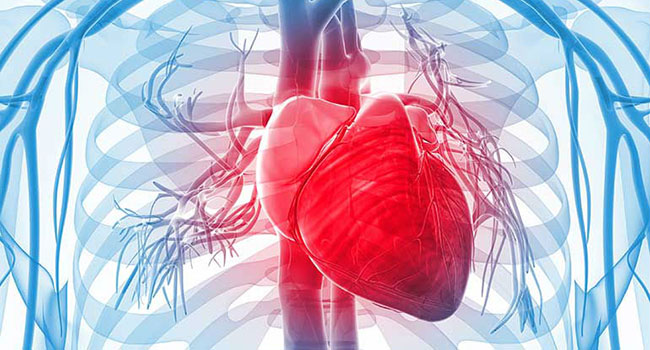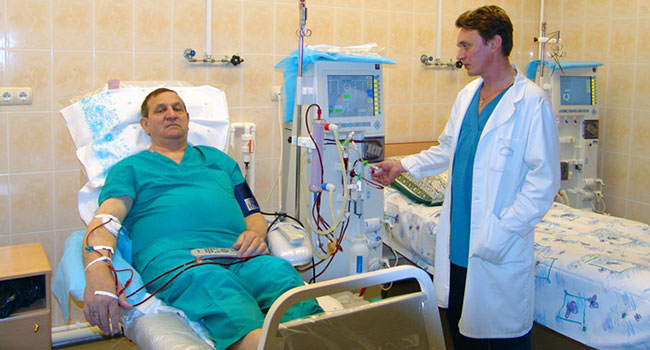Symptoms of Kidney Failure
Kidney failure is a very serious phenomenon, which, without proper treatment, inevitably leads to death. As a result (this is what pathology is called in medicine), the functioning of nephrons ceases, urine ceases to be produced. Because of this, many toxins accumulate in the body from decay products and toxins, gradually destroying all organs and tissues in the body. Kidneys can fail in both adults, the elderly, and children.
Acute renal failure has a positive prognosis in contrast to its chronic form. To a greater extent, older people suffer from pathology. When the kidneys fail, the disease is divided into three forms:
- Prerenal. The most common form is caused by insufficient blood flow to both organs of the urinary tract. As a consequence, there is an accumulation of toxins due to a reduced filtration function.
- Renal. It is characterized by damage to the parenchyma of the kidney.
- Postrenal. There is an obstruction to the passage of fluid excreted by the kidneys.
The causes of the prerenal type of pathology lie in problems with the ejection of blood from the heart. These are shock, arrhythmia, a blood clot in the pulmonary artery, and so on. The condition can arise as a result of a burn, persistent diarrhea or vomiting, peritonitis and other phenomena when the extracellular fluid leaves the body. Kidney failure is also formed during the formation of sepsis or due to an anaphylactic reaction.
When renal failure of the kidneys occurs, acute types of diseases are considered to be development factors. These are vasculitis, thrombosis of the vessels of the urinary organ and others.

If the connection with the pathology of the heart is not diagnosed, it can go into the renal
In the case when the kidneys failed and postrenal acute insufficiency was diagnosed, the cause of the phenomenon is the blockage of the movement of urine along the urinary tract. Factors are sulfonamide crystals, if taken. When a patient is treated with antidepressants, it is possible to earn urate stones.
In general, the causes of kidney failure due to obstruction of the outflow of urine are divided into functional and mechanical. The first include neuropathy, long-term use of ganglionic blockers, acute brain pathologies, childbearing.
Mechanical factors include tumor processes, reduction of the ureter, the consequences of surgery (ligation of the ureters). In representatives of a strong half of the population, inflammation or enlargement of the prostate gland can cause pathology. If the obstruction of the passage of urine is successfully removed, the failure of the kidney and the symptoms that tormented the patient disappear without a trace.

Removal of the cause of the obstruction causes complete restoration of renal filtration without any consequences of kidney failure.
Toxins - pests of the kidneys
When an organ is poisoned with toxins, its insufficiency may develop. On hemodialysis, every fifth patient suffers from nephrotoxins. In modern medicine, many cases of diseases of the urinary organs from substances dangerous to them have been noted. These are Quinine, aminoglycoside antibacterial drugs, fluorine-containing painkillers and others.
Intoxication of the body, expressed by renal failure, also occurs with products of its own production. These are hemoglobin and myoglobin, which are released from blood cells and muscles. The phenomenon is associated with the splitting of muscle tissue due to injury, or nephrological disease with convulsions.
If the kidneys have failed in a child or adult, the cause is also looked for in the action of external toxins. These include alcohol, drugs, phosphorus, heavy metal salt, as well as chlorine and bromine derivatives, acetylsalicylic acid, sedatives and others. More recently, the harmful effects on the urinary system of statins and other drugs that lower cholesterol in the blood have been revealed.

What manifestations should alert?
Symptoms of kidney failure mainly depend on the form of manifestation.
Acute type of pathology
Symptoms of the disease are accompanied by 4 stages of progression. In the first phase, the organ itself is damaged (shock). After comes the degree of oligoanuria, but only in 30% of patients. In this case, the danger causes edema of the lungs and liver, intestinal bleeding due to damage to the mucous membrane, a change in the components of the electrolyte.
The third phase is polyuria. It develops 1-3 weeks after the formation of the disease. Possible dehydration with hypokalemia. Glomerular filtration increases, but the effect of antidiuretic hormone remains low. The fourth phase of recovery is long. Reaches a year. Protein decreases, nitrogenous substances in the blood return to normal.
Signs of kidney failure in patients with an acute form of the disease are expressed by the addition of kilograms due to swelling of the lower extremities and face, nausea, vomiting, itching of the epidermis, as well as severe pain in the abdomen, general malaise. If the situation worsens, the patient notices the unreasonable appearance of bruises on the body, feels drowsy, and has shortness of breath.
Important! It is worth understanding how dangerous the disease is, and at the first manifestations of it, seek help from a doctor.

Chronic type of pathology
A chronic disease is caused by a gradual loss of organ efficiency, but such a process is irreversible. Manifestations depend on the death of nephrons and the ability of the organ to compensate for their functions by other parts of the kidneys. As the disease progresses, other body systems are also affected. Slags accumulate, there is a failure in metabolic processes. The parenchyma will be replaced by connective tissue, which provokes the development of nephrosclerosis.
If the kidneys fail, the cause must be sought in the following diseases:,. Pregnancy, allergies, urinary tract infection, hemorrhage, and toxins that have entered the body with medications can aggravate the situation.
Ways to get rid of the pathology of an acute form
In an acute attack of the disease, the prognosis depends on timely medical care, which will give a person a chance to survive. The patient must be urgently taken to the intensive care unit and given anti-shock therapy. It includes blood replenishment through plasma transfusion, protein solutions, Reopoliglyukin. If necessary, Furosemide (loop diuretic) is prescribed, Dopamine - as a last resort.
Conservative treatment is carried out with a mild degree of acute renal failure. Why? This is quite enough to eliminate the renal failure. What to do? In case of injuries and wounds, it is necessary to remove all dead tissues; in case of hyperkalemia, refuse products containing potassium. Increase the daily amount of fluid compared to diuresis, vomiting losses, diarrhea and + 400 milliliters. Anabolic steroids actively cope with lowering the rate of protein breakdown. Taking antibiotics can be dangerous and can make things worse. Therefore, they are prescribed with caution.
In the treatment of insufficiency at the stage of prerenal progression, it is important to eliminate the disease that provoked the pathology. An increase in fluid is prohibited with a decrease in the force of contractions of the heart. If the reason lies in blocking the path for the passage of urine, doctors perform an operation. When an infection causes a pathology, Klafaron, Fortum are prescribed along with Metronidazole. Aminoglycosides are contraindicated. If therapy fails, hemodialysis is recommended. Blood purification procedures are also useful.

For the renal type of renal failure, complex treatment is carried out, as a result of which complete healing is possible. The combination includes antispasmodics, loop diuretics and alkaline solutions. Enhances the effect of drugs Dopamine in small doses. The therapeutic procedure is repeated up to 12 times. Glucose and insulin will help to correct potassium. Ion exchange resins are prescribed in rare cases.
Methods used in the treatment of chronic pathology
In the case when the kidneys failed, and how much is left to live, the person does not know, it is necessary to consult a doctor. With such a development of events, one can only hope for medicine and experienced specialists. With timely treatment, people with a similar pathology live for a long time.
It is important to understand the cause of the disease and treat the concomitant disease. In case of violation of the outflow of urine, surgical intervention will be required. Antibacterial drugs are often used taking into account the nephrotoxic effect. In the case of the development of glomerulonephritis, cytostatics and corticosteroids are prescribed.
What is fraught with the absence of treatment of pathology?
You should be wary of oliguric symptoms. They are able to signal the possible development of complications of the acute form of the disease: inflammation of the urinary organs, sepsis, which threatens patients with a fatal outcome. Stomatitis, pneumonia, inflammation of the parotid lymph nodes are also possible.
Bleeding in the gastrointestinal tract, caused by erosions and arising from poor blood clotting, becomes a frequent occurrence. Anemia provokes a delay in the maturation of the remaining red blood cells, reduced production of erythropoietin by kidney cells.
When a patient has lived for a long time with urinary problems, he develops chronic renal failure. Complications of pathology affect the centers of the brain of the head. In the event of a decrease in the protective function, the body is affected by infections. The heart and blood vessels react with arrhythmia and hypertension, sometimes complicated by a stroke or heart attack. Low calcium content leads to bone fractures (for this it is important to eat calcium-containing foods and take micronutrient tablets). If anemia is complicated by bleeding from the stomach or intestines, the person may die.
Kidney failure is a dangerous pathology, often depriving people of their lives or leading to disability. Therefore, it is important to undergo an examination at the first alarming symptoms and follow all the doctor's instructions.
IT'S IMPORTANT TO KNOW!
For the treatment of kidney and urolithiasis, patients use the innovative development of Russian scientists, which has passed clinical trials and has proven its effectiveness. Renon Duo - only 3 capsules will eliminate back pain, kill bacteria and pathogenic flora, effectively help with swelling!




